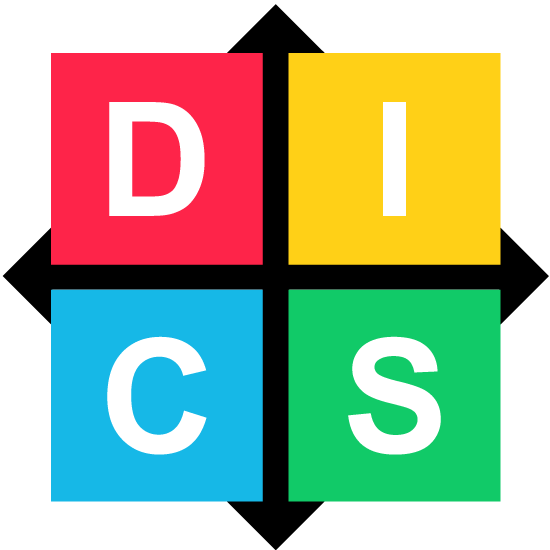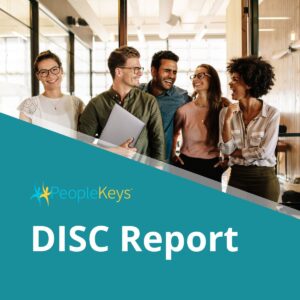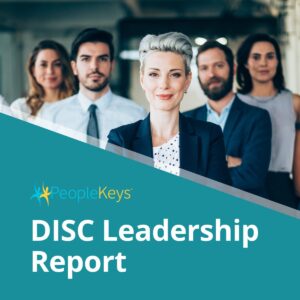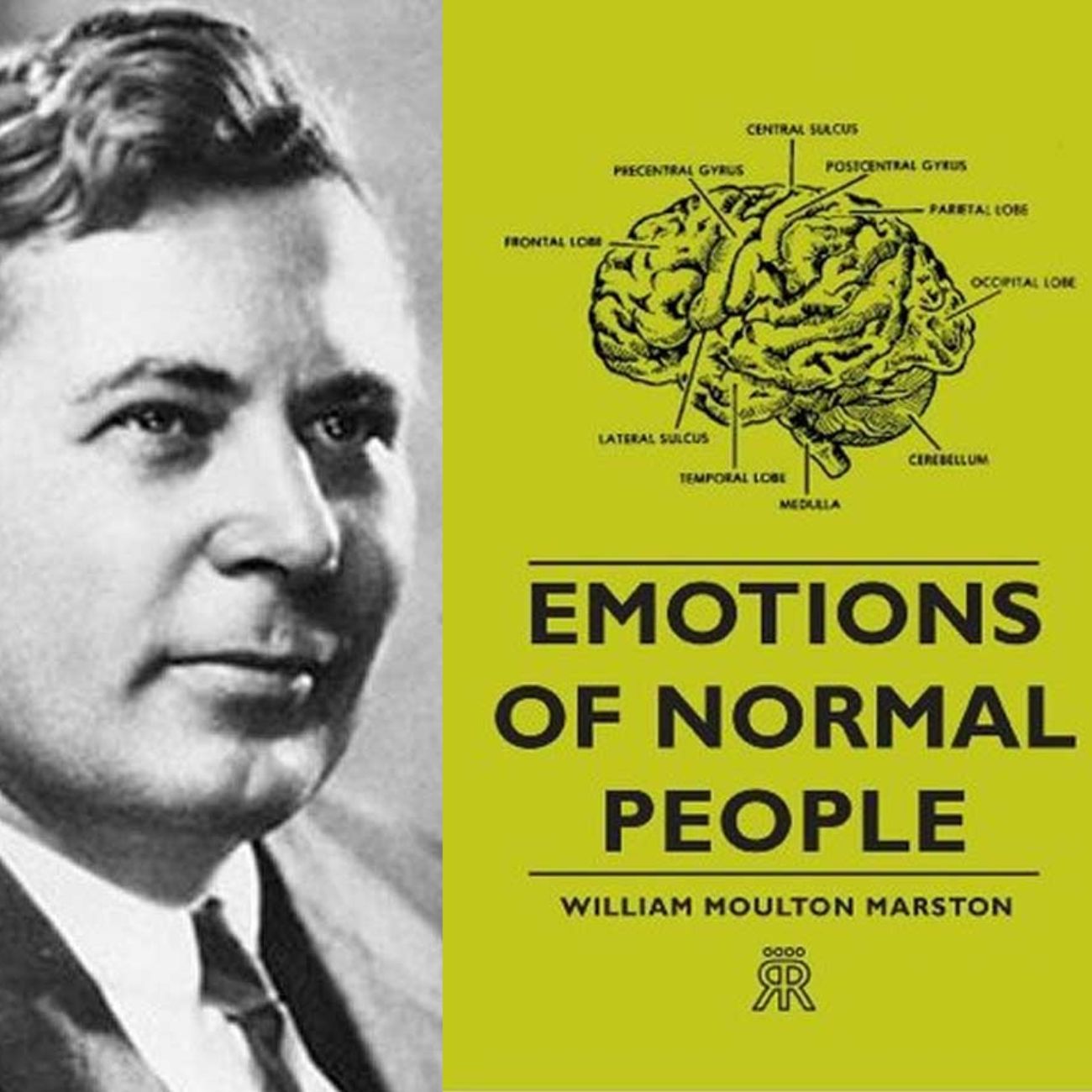What is the DISC Assessment?
The DISC assessment is a powerful tool designed to understand and improve human behavior, communication, and interpersonal relationships. Rooted in extensive research and practical applications, DISC offers a straightforward and versatile framework for personal and professional development.
DISC is Flexible & Easy to Use
Behavioral Assessment Tool
Four Primary Traits
DISC categorizes individuals into four primary personality traits: Dominance (D), Influence (I), Steadiness (S), and Conscientiousness (C).

Communication Styles

Workplace Applications
DISC is frequently applied in professional settings for team building, leadership development, conflict resolution, and improving interpersonal dynamics better understanding one another.

Adaptability
Individuals can learn to recognize and adjust their communication styles based on the DISC style and preferences of others, leading to more effective collaboration and cooperation.

Personal & Professional
The Four DISC Personality Traits
D
Dominance
Risk-takers and self-starters, often focused on results and challenges.
C
Compliance
Detail-oriented and analytical, valuing accuracy and quality.

I
Influence
People-oriented, enthusiastic, and thriving in social interactions.
S
Steadiness
Reliable and consistent, seeking stability and support.
PeopleKeys DISC Assessments
PeopleKeys offers DISC assessments and specialized variations tailored to unique applications.

DISC Report
The PeopleKeys DISC Report identifies four key personality traits—Dominance, Influence, Steadiness, and Compliance—to improve self-awareness and communication. This versatile tool, available in multiple languages, supports personal growth, hiring, and team building worldwide.

DISC Leadership Report
The PeopleKeys DISC Leadership Report helps organizations identify and develop leaders by analyzing their unique behavioral styles. This customizable tool provides insights into strengths, growth areas, and adaptability for effective succession planning and coaching.

DISC Sales Report
The PeopleKeys DISC Sales Report helps you identify your strengths and limitations in sales, enabling you to align your style with clients’ needs for better results. This tool supports hiring, sales training, team building, enhancing communication, motivation, and sales performance.

DISC Career Report
The PeopleKeys DISC Career Report is perfect for anyone seeking career guidance, whether you’re a recent grad or a seasoned professional. Gain valuable insights into your work style and communication preferences, helping you understand your workplace strengths and limitations.
How DISC Enhances Communication & Decision-Making
Understanding DISC profiles enhances communication and decision-making by enabling individuals and teams to tailor their interactions and strategies according to different styles. Recognizing whether a team member prefers direct, data-driven, or empathetic communication helps reduce misunderstandings and fosters clearer dialogue. DISC also informs decision-making by highlighting diverse perspectives and decision styles, allowing for more balanced and effective choices.
By aligning communication strategies and collaboration approaches with DISC insights, teams can work more harmoniously, resolve conflicts more efficiently, and make better-informed decisions.
Applications of DISC in the Workplace
DISC is a versatile tool widely utilized in professional settings to optimize various aspects of team dynamics and individual performance. Its applications span across team building, leadership development, conflict resolution, and productivity enhancement:
- Team Building: Enhancing collaboration and understanding among team members.
- Leadership Development: Tailoring leadership approaches to different DISC styles.
- Conflict Resolution: Addressing interpersonal issues with insights into behavioral tendencies.
- Sales Training: Leveraging DISC insights to boost sales performance.
- Recruitment & Hiring: Streamline your recruiting while making more informed decisions with the integration of DISC.
History of DISC
The foundation of DISC dates back to the early 20th century when psychologist William Moulton Marston explored the connection between human emotions and behavior. His groundbreaking work laid the groundwork for the DISC model, which was further refined and popularized by experts such as Walter V. Clarke and John G. Geier.
Over the decades, the DISC model has undergone continuous development, incorporating advances in psychology and research. Today, DISC is a widely recognized and respected tool for personality assessment, significantly influencing the fields of psychology, education, and organizational development. Its evolution reflects its adaptability and enduring relevance in understanding human behavior and enhancing personal and professional growth.
Why PeopleKeys DISC?
While the DISC framework is widely accessible, it’s important to note that not all DISC assessments are created equal. Many free online assessments may lack credibility and accuracy, leading to potentially misleading results.
PeopleKeys stands out as a trusted leader in DISC assessments, with over 40 years of rigorous research and validation ensuring the highest levels of accuracy and reliability. Our assessments are meticulously developed to provide accurate insights into behavioral styles, backed by ongoing research and refinement. This commitment ensures that PeopleKeys’ DISC assessments remain at the forefront of precision and effectiveness, making them indispensable tools for both personal and professional growth.
By choosing PeopleKeys, you can trust that you’re receiving a tool built on a foundation of proven expertise and continuous improvement.
Over 40 Years of Unlocking Human Potential
PeopleKeys’ validated and accredited solutions address specific assessment tools, training, and technology needs. The PeopleKeys Predictive AI™ process plays a crucial role in revolutionizing our hire-train-retain process, predicting successful job matches and enhancing talent management strategies.
Get Started with a PeopleKeys Business Account
Inquire if a PeopleKeys business account is right for your needs.
No Setup Fee
Acces to Highly Validated Assessments
Outstanding Customer Service
Frequently Asked DISC Questions
What does a DISC profile tell you?
How long does a DISC test take to complete?
A PeopleKeys online DISC assessment is designed to be quick and convenient, typically taking only 10–15 minutes. This makes it ideal for individuals and teams seeking actionable insights without requiring a significant time investment.
Do I need to be certified in DISC?
While certification is not required to understand or use DISC, it offers a deeper level of knowledge about DISC theory, application, and interpretation. Certification is particularly valuable for professionals in coaching, management, HR, or consulting who want to apply DISC effectively in their work and provide tailored guidance to others.
Can DISC personality styles change?
Yes, DISC personality styles can adapt over time due to environmental factors, stress, or personal growth. For the most accurate insights, we recommend retaking a DISC assessment every two years, especially if you’ve experienced major life events or career changes. Regular reassessments help ensure that your profile reflects your current behaviors and preferences, offering the most relevant guidance for personal and professional development.
Is DISC culturally consistent?
Yes, the DISC model is universally applicable and has been used successfully across diverse cultures and industries. However, cultural nuances may influence how certain traits are expressed or perceived, which can be accounted for in interpreting results. PeopleKeys assessments are designed to provide meaningful insights regardless of cultural context.
How does DISC compare to Myers-Briggs (MBTI)?
DISC and MBTI are both widely used personality tools, but they serve different purposes. DISC focuses on observable behaviors and is designed to be straightforward and practical, making it ideal for personal development, team building, and workplace applications. MBTI delves deeper into internal thought processes, which can make it more complex. Additionally, DISC assessments are legally compliant for pre-hiring and recruitment processes, while MBTI is not recommended or permissible for such uses due to ethical and legal limitations.
Can DISC be used in personal relationships?
Absolutely! DISC is a powerful tool for improving personal relationships. By understanding your own communication style and recognizing the preferences of others, you can foster greater empathy, reduce conflicts, and build stronger connections with family, friends, and partners.
How can DISC be applied in professional development?
DISC assessments are invaluable for professional growth. They identify your natural strengths, preferred communication styles, and areas for improvement, helping you set actionable goals. DISC insights can guide leadership development, enhance teamwork, and support career advancement by aligning your strengths with opportunities for growth.
Who uses DISC assessments?
DISC assessments are widely used by individuals, teams, and organizations across various industries. They are popular among HR professionals, coaches, educators, managers, and consultants for team building, conflict resolution, hiring, and professional development. Check out our Applications of DISC page to learn more.
How accurate are DISC assessments?
DISC assessments vary in accuracy and reliability depending on the provider. While there are many free DISC tests available online, their validity and quality are often questionable. PeopleKeys DISC assessments are based on decades of validated behavioral research and are continually refined to ensure they deliver precise and actionable insights. For the best results, it’s important for individuals to answer the questions honestly and thoughtfully.
Can DISC help with hiring decisions?
Yes, DISC can be a valuable tool for hiring and onboarding. It helps identify candidates’ natural strengths, communication styles, and suitability for specific roles. While DISC is not intended to make hiring decisions on its own, it complements other evaluation methods by providing deeper behavioral insights.
Can DISC assessments be customized for specific industries or teams?
Yes, PeopleKeys offers customizable DISC assessments tailored to specific industries, roles, or team needs. This ensures the results are highly relevant and actionable for your organization’s unique goals.
Are DISC assessments suitable for children or students?
Yes, PeopleKeys offers DISC assessments designed for younger audiences. Our StudentKeys tools help children and students understand their behavioral tendencies, improve communication skills, and foster stronger relationships at school and home.
How does DISC improve team performance?
DISC assessments enhance team performance by identifying individual strengths and potential challenges. Teams can use these insights to improve communication, resolve conflicts, and align tasks with team members’ strengths, ultimately boosting collaboration and productivity.
Is DISC a psychological test?
No, DISC is not a psychological test. It is a behavioral assessment that measures observable traits and tendencies. DISC does not assess intelligence, mental health, or cognitive ability. It is a practical tool for understanding and improving behaviors in various contexts.
How can I use DISC in leadership development?
DISC assessments are invaluable for leaders looking to improve their effectiveness. By understanding their own leadership style and the styles of their team members, leaders can tailor their approach to motivate, communicate, and delegate more effectively.
What is the validity of PeopleKeys DISC assessments?
PeopleKeys DISC assessments are backed by decades of research and are validated for accuracy and consistency. They meet international standards for behavioral assessments, ensuring they provide reliable and meaningful results.
Featured Blogs on DISC
The True Value of a Free DISC Assessment
Maybe someone suggested that DISC will help you to become more self-aware. They also said there are plenty of free sites to go and take a free…
Ultimate Reasons Employees Quit & How PeopleKeys DISC Can Help
Employee retention is a critical issue for organizations of all sizes, from small family-owned businesses to Fortune 500 companies…
Get the Power of Personality to Your Inbox
Join to receive regular content on DISC and real-world applications!









